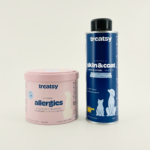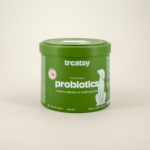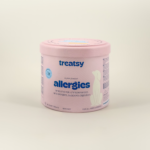It is estimated that around 8 million dogs in Europe suffer from diet-related skin or digestive symptoms. Both are typical characteristics of food sensitivity or intolerance.
At the same time, around 16 million dogs in Europe suffer from skin disorders, most of which are caused by environmental allergies (pollen, mites, fleas, etc.).
For these two ailments, the symptoms can often be similar, particularly on the skin: appearance of red patches and/or scales, itching, hair loss, bad odor, otitis externa, etc. It is therefore not always easy to diagnose the real cause of these symptoms.
A dog who suffers from a food allergy or food intolerance sees his immune system react in an exacerbated manner to an allergen. The most common canine allergens are beef (36%), dairy (28%), wheat (15%), egg (10%), chicken (9.6%), lamb and sheep (6.6%). It is important to note that food intolerances or allergies are always the result of a reaction of the body to a protein that the animal has consumed. Fats and carbohydrates do not cause allergies or intolerances.
In some cases, food intolerances or allergies can also cause digestive problems, such as vomiting, flatulence or diarrhea.
If your dog exhibits one or more of these symptoms, we recommend that you consult a veterinarian. He will most likely advise you to implement a food elimination diet in order to determine the allergen to which your dog is sensitive, or will diagnose an external allergy in which case several solutions exist.
How to reduce the risks of food sensitivities, and how to help dogs who suffer from allergies?
To avoid food sensitivities, it is recommended to offer your dog a good quality diet, which offers a limited amount of protein sources. By offering a food with a single source of animal protein, you will limit the risks of intolerance. The same goes for plant proteins.
If your dog is already showing symptoms, consult your veterinarian: there are dog foods based on hydrolyzed proteins or a new unique protein that your pet will not react to (such as insect proteins). Your veterinarian will be able to advise you.
If your dog is sensitive to certain animal or plant proteins, be careful not to give him treats or snacks containing those specific proteins. Be sure to offer foods specially formulated to limit the risk of your dog’s immune system reacting and take care of their digestive and skin health.
If your four-legged friend suffers from environmental allergies, it is important to take care of his skin and coat by providing him with the right nutrients necessary to rebuild the epidermis and support the skin barrier.



